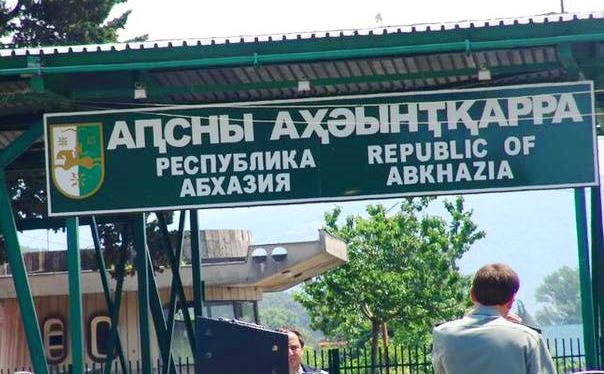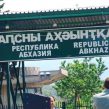
Russian-backed Abkhaz Separatist Regime Steps Up Discrimination of Ethnic Georgians
Publication: Eurasia Daily Monitor Volume: 11 Issue: 124
By:

On June 30, the Abkhaz separatist regime announced that it would remove from the voter lists 22,787 ethnic Georgians living in the Russian-occupied Abkhazia. The separatist regime officials claimed that those people acquired so-called “Abkhaz passports” illegally and hence, as non-citizens, they could not qualify to vote in the upcoming August 24 presidential election and beyond (Civil.ge, July 1). The people, whose names were deleted from the voter lists, represent the overwhelming majority of the 30,000 ethnic Georgians, who were allowed to return to Abkhazia after the Russian-sponsored separatist war in the region in 1992–1993. The rest of the 320,000 Georgians living in Abkhazia before the war were ethnically cleansed, killed or expelled, by Abkhaz separatist militias and Russian volunteer fighters during and right after the war.
Discrimination against those Georgians, who still reside in Abkhazia, never stopped after the war ended. Abkhaz militias and Russian occupying forces routinely resort to arbitrary killings, kidnappings, torture, lootings, large-scale expropriation of property and other harsh methods against local Georgian villages. Striking off almost 23,000 Georgians from the voter lists is just the latest step in the separatist regime’s uninterrupted policy of methodical repression and exploitation, which Georgians encounter on a daily basis.
This latest step by the separatists, however, is particularly noteworthy as it reveals the increased sense of insecurity within the regime. Specifically, as the Abkhaz are fleeing economically impoverished, crime-ridden, and leave politically unstable Abkhazia for Russia. Meanwhile, the proportion of Georgians is automatically increasing in the depopulated region because of the Abkhaz exodus. Consequently, the separatists fear that this may enhance the political clout of the Georgians. Hence, the regime once again resorted to discriminatory policies to disenfranchise the Georgians and relegate them to a marginal status.
In fact, depriving Georgians of the so-called “Abkhaz citizenship” has been the key demand of the recent opposition-led anti-government protests in Abkhazia, which deposed incumbent separatist president Alexander Ankvab. Then one of the opposition leaders, Rau Khajimba went as far as to declare that the expulsion of the Georgians from Abkhazia was the demand of the Abkhaz people (Kvirispalitra.ge, May 30). Currently, Khajimba is the frontrunner presidential candidate in the upcoming August election.
Moreover, disenfranchisement of ethnic Georgians perfectly serves Moscow’s interests in the region. On the one hand, the Kremlin is trying to weaken and even eradicate any sort of Georgian presence in Akhazia. On the other hand, it punishes relentlessly pro-western Georgia—which, after signing an Association Agreement (AA) with the European Union (EU) on June 27, is moving one step closer to Europe to the great dismay of Russia (Maestro TV, Rustavi 2 TV, June 27).
Overall, Moscow and its puppet Abkhaz separatist regime have indeed valid reasons to get anxious about recent developments around Abkhazia. In the latest development, on June 5, the United Nations (UN) General Assembly re-approved its annual resolution on the refugees from Georgia’s Abkhazia and Tskhinvali (South Ossetia) regions. The UN resolution condemned again the use of force to change the demographic picture in the occupied regions and reaffirmed the refugees’ fundamental right to return to their homes. Most noteworthy, this year 69 countries voted in support of the resolution, an increase of seven votes in comparison to the previous year. Meanwhile, the number of countries voting against the resolution dropped by three from 16 to 13 (Tabula.ge, June 5). Although this resolution does not change anything in real terms for the Georgian refugees, it is still showing the emerging trend that the international community is becoming more aware of the ongoing ethnic cleansing in the Russian-occupied Georgian regions. It also shows that Georgia is gaining more diplomatic help in its plight for the refugees’ return to their homes sometime in the foreseeable future.
Moreover, Russia and separatist Abkhazia also experienced one other diplomatic setback. In March, the Polynesian island nation of Tuvalu withdrew its 2011 formal recognition of Abkhazia and South Ossetia. In the last two years, Tuvalu became the second nation after the South Pacific island nation of Vanuatu, which retracted its recognition of Georgia’s breakaway regions as independent (Civil.ge, March 31). Abkhazia and South Ossetia now retain the recognitions by Venezuela, Nicaragua, and the small Pacific island nation of Nauru. All these nations recognized Russian occupied regions as a result of Moscow’s rigorous diplomatic campaign, strengthened by the promise of Russian financial and political assistance.
The recent loss of formal recognitions from Tuvalu and Vanuatu, increasing number of votes on UN General Assembly’s annual resolution on refugees in Georgia, and growing proportion of Georgians in Abkhazia might be the first indications to Russia and to the Abkhaz separatist regime that the occupation of Abkhazia and its artificial “independence” are not sustainable in the long run. In this light, the separatist regime’s effort to deprive the voting rights of the overwhelming majority of ethnic Georgians in Abkhazia appears to be a desperate step to avert the inevitable that looms on the not too distant horizon: Abkhazia’s eventual reintegration with Georgia and the return of hundreds of thousands of Georgian refugees. However, things may get worse as the Abkhaz separatist regime and Russia might try to increase discrimination of the 30,000 Georgians living in Abkhazia and eventually expel them, if such an opportunity arises. Generally, things for now do not look promising for the thousands of ethnic Georgians living in Russian-occupied Abkhazia.




